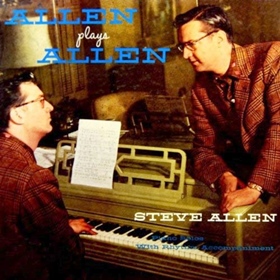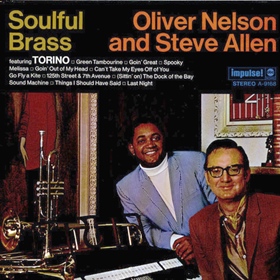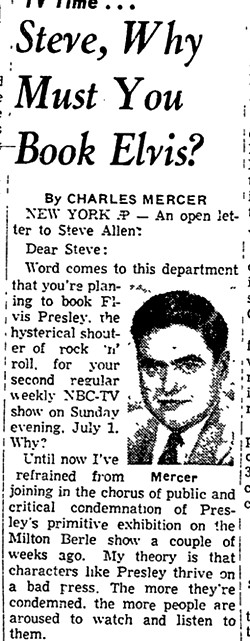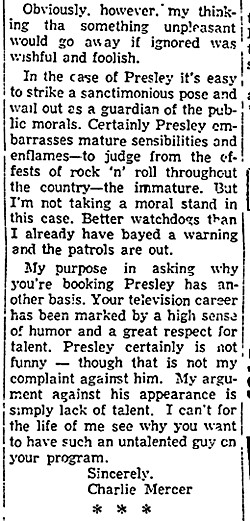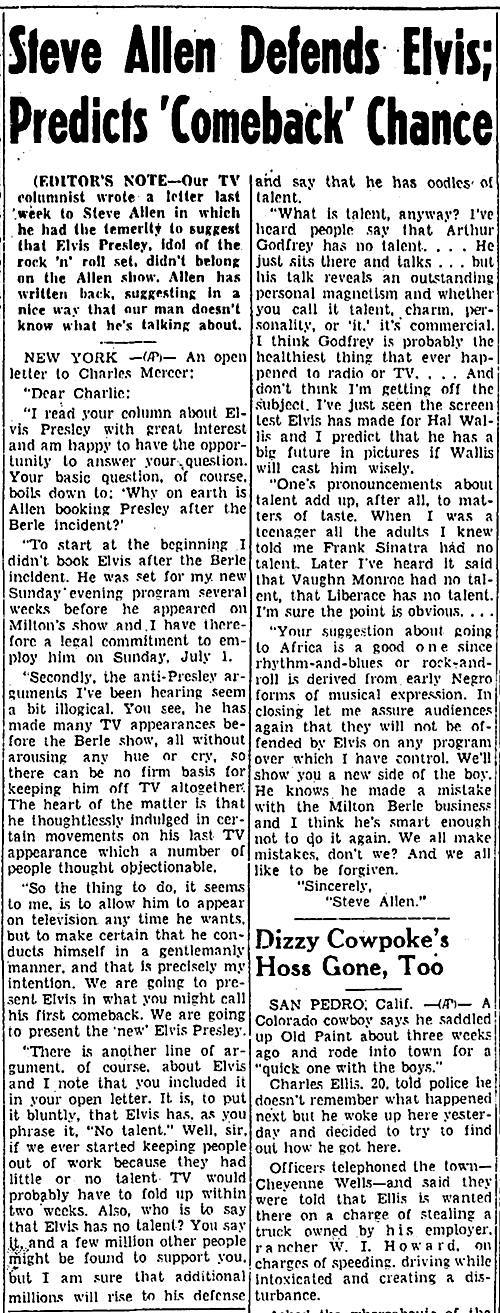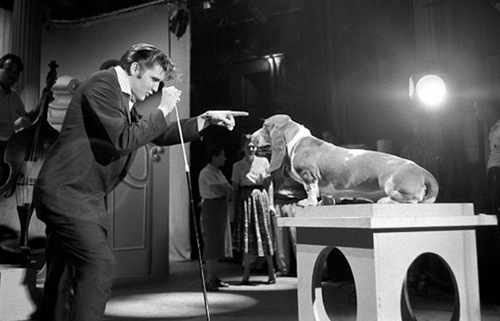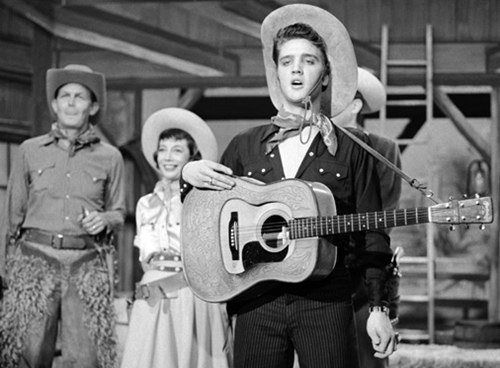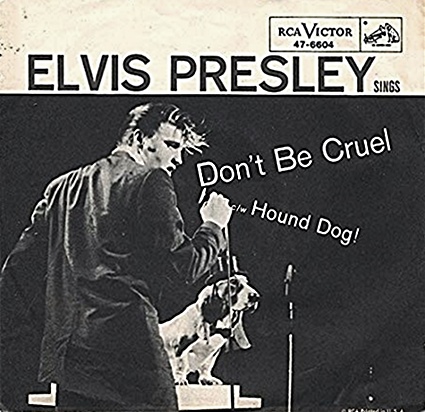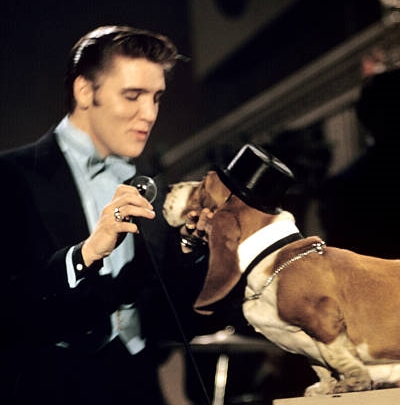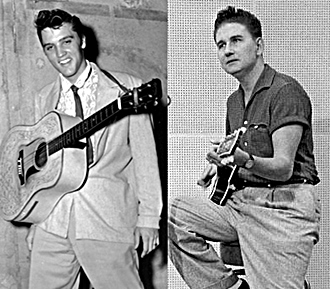 |
 |

THE STEVE ALLEN SHOW Was Steve Allen really the villain that he is usually portrayed as in the Elvis story? Please note: I would like to thank everyone who contributed to the lengthy discussions on the various Elvis forums about this topic over the years, and special thanks to anyone who brought new, hard evidence to the table that has been woven into this article. SLB. Much has been written about The Steve Allen Show appearance over the years, and one would perhaps be forgiven for thinking that there was nothing left to talk about in regard to what might be Elvis’s most infamous TV appearance amongst his fans. And yet, with each retelling of the story, much of the information required to give a fair hearing to Allen is conspicuous by its absence. In the past, this might have been done because some of the information was not available, but with the appearance of online newspaper and magazine archives over the last decade (and, indeed, websites such as YouTube) it is much easier to piece together the complete story rather than the fragments of it that have been passed down amongst Elvis fans over the last sixty years. After all, alongside Parker, Allen has become the second of the pantomime villains in the Elvis story, and it is time to investigate anew in order to see what really happened, and what Allen’s real relationship with rock ‘n’ roll was.
Let’s start with a quick look at Allen the man. I confess that I personally don’t find Allen’s comedy particularly funny, although I am perfectly capable of realising he was a highly intelligent, and certainly talented, man. His songs were recorded and performed by the likes of Peggy Lee, Bobby Darin, Judy Garland, Steve Lawrence, Nat King Cole, Oscar Peterson, and Ella Fitzgerald. In 1956, Andy Williams recorded an entire album of Allen’s songs. Indeed, one of his compositions won a Grammy award in 1964. He was also a very good, although not great, jazz pianist, and was nominated for Emmys for his acting, writing, and presenting duties. The 1950s incarnation of The Steve Allen Show itself was nominated for eight Emmys, winning one of them. Neither the show nor Allen himself were in any way slouches, and were mainstays of early television, hugely important within the history of TV, and Allen remains an influential figure some eighteen years after his death.
But where do Allen and Elvis first cross paths? The answer appears to be in the June 1956 edition of TV Radio Mirror, where Allen had a regular column reviewing the latest record releases (mostly albums). It is worth remembering that this column would have been written probably in mid-May, in other words before the second Milton Berle appearance. In his relatively bland and mundane review of Elvis’s first album, Allen tells us that RCA is “excited” about Elvis, that the new album contains a “variety of songs,” and that he “should do OK with this album” – while hardly an ecstatic recommendation, for a man that supposedly hated rock ‘n’ roll with a passion it seems odd that not a single work of the paragraph-long review attempts to knock Elvis, his music, or the genre. Prior to the second Milton Berle appearance, Allen had already booked Elvis for his own TV show (and yes, we do have proof of the timing thanks to adverts from the period). However, after the furore led by the New York Times’ columnist Jack Gould following the Berle performance of Hound Dog, Allen was encouraged to drop him from his show. In fact, on June 22 1956, syndicated columnist Charles Mercer wrote an open letter to Allen encouraging him to drop Elvis from his show. Mercer concludes by writing: “My argument against his appearance is simply lack of talent. I can’t for the life of me see why you want to have such an untalented guy on your program.”
Less than a week later, Allen responded in print with a letter to Mercer. He defends Elvis’s previous behaviour on television, and then proceeds to comment on Mercer’s accusation that Elvis was talentless. “Who is to say that Elvis has no talent?” he writes. “You may say it, and a few million other people might be found to support you, but I am sure that additional millions will rise to his defense (sic) and say that he has oodles of talent…I’ve just seen the screen test Elvis has made for Hal Wallis and I predict that he has a big future in pictures if Wallis will cast him wisely…When I was a teenager all the adults I knew told me Frank Sinatra had no talent. Later I’ve heard that Vaughn Monroe had no talent, that Liberace has no talent. I’m sure the point is obvious.” What seems remarkable here is not that Allen is defending the decision to have Elvis on his show (we would expect that), but that he goes far beyond that, comparing him to showbiz establishment figures like Sinatra and Liberace. Allen isn’t just doing what he has to do to back up his own decision, but is fighting Elvis’s corner as well.
This public exchange in the June 1956 newspapers seems all the more remarkable because so many accounts of the Allen show appearance (even the most recent ones) take the decision to leave it out. It clearly doesn’t sit well with the Elvis-world myth that Allen hated rock ‘n’ roll and was only interested in ridiculing it. However, this doesn’t hold up to scrutiny either – out of all of the 1950s long-running variety-format shows, it was Steve Allen’s that welcomed more rock ‘n’ roll acts than any other, including Jerry Lee Lewis, Brenda Lee, The Coasters, The Diamonds, and Fats Domino, and most of these appeared on more than one occasion. Why would someone who hated rock ‘n’ roll include these performers when he could easily have attracted bigger names from outside the genre? The Diamonds and The Coasters were hardly bringers of great viewing figures – and, it should be added that, at the time of his booking, neither was Elvis. But what about the ridiculing of rock ‘n’ roll through the infamous reading of the lyrics of Be-Bop-a-Lula which is often hauled out as an example of Allen’s hatred for the genre? If that wasn’t a contempt for rock ‘n’ roll, what was? Again, the issue here is that we only know half of the story. Here is an excerpt from a 1992 interview with Steve Allen:
And let’s not also forget that Steve Allen went to see Elvis perform in Vegas on more than one occasion – if he really was someone who hated rock ‘n’ roll and everything associated with it, he had a strange way of spending his free time.
And that brings us to Elvis’s appearance on the show itself, with Elvis wearing a tux and singing Hound Dog to a basset hound. Comments made by many fans say that Allen was attempting to humiliate Elvis in this way, and that Elvis was embarrassed by the whole ordeal, but there is no evidence that Allen was setting out to embarrass Elvis or humiliate him. As Allen pointed out in his autobiography, his show was a comedy show, and ultimately didn’t suit Elvis – and it wasn’t just Elvis who was presented in comedic fashion when singing. Perhaps the big mistake was Parker’s for signing Elvis to a TV show that was inappropriate for him. But, for the next forty years, Allen only spoke highly of Elvis – and honestly, it should be said. While he praised his talents, he never changed his mind that Elvis did not have a beautiful singing voice. Returning to the 1992 interview from earlier:
Allen then talks of how Elvis didn't have a beautiful sound in the way that the young Sinatra or Ella Fitzgerald has (we can assume that Allen wasn't aware of some of the early 60s records). But he goes on to say that he believes that saying someone doesn't have a beautiful voice is not an insult - he suggests the obvious example of a great singer without a beautiful voice is Louis Armstrong. Four years later, in 1996, Allen repeated the comment:
Elvis might have been embarrassed by the experience, but we shall never know because he changed his story about the show and his thoughts on Allen a number of times. Hours after the show aired, Elvis told Hy Gardner that he “really enjoyed” the show. Then he told Westley Ryder, a writer for TV Star Parade that he had been made to “stand like a biddy” with the writer saying that “Elvis vowed he would never sing in that restrained subdued fashion again.” In 1972, Elvis told the makers of Elvis on Tour that he thought Steve Allen was “as funny as a crutch.” And then, in 1974, with Allen in the audience, Elvis says: “Steve Allen had me on the show, and at that time he outrated the Ed Sullivan Show…Steve has a weird mind, you know. He’s a funny kind of man, you know, he’s a brilliant genius of comedy. He had me dressed in a tuxedo, singing to a little fat dog. I love him for it, but I will never forgive him.” And perhaps those final words (“I love him for it, but I will never forgive him”) are how Elvis really felt about the Allen show itself. Perhaps he was embarrassed, but even at the time of the show itself, Elvis was well aware just how much the show did for his career. He might have hated singing to the dog, but he was savvy enough to include a picture of him singing to the dog as the front cover image of the Hound Dog single.
If Elvis hated the performance so much it is strange that he let it be the cover of his most successful 45rpm
If Elvis really did hold a grudge, then we have to question Elvis’s motives rather than Allen’s. After all, let’s look at the chain of events that led to the appearance itself: Elvis grows up in poverty, gets a break at Sun records. By the age of 21, he is signed by one of the biggest labels in the business. Then he makes his national TV debut hosted by two giants of the 1930s and 1940s music scene, which is swiftly followed by his first national hit record. By April, he is appearing with one of the stalwarts of American showbusiness, Milton Berle. And then he gets hired by Steve Allen, one of the biggest names on American TV, and beats The Ed Sullivan Show in the ratings – and he’s moaning about it. I wonder whether Elvis would have said yes to that series of events if he had been offered it in 1953 when he entered the Memphis Recording Service to record that first acetate. What is clear is that virtually all of the accounts of the Steve Allen Show appearance, and Allen’s view of Elvis and rock ‘n’ roll in general, have never really told the full story, nor have they always been truthful. The reading of the lyrics of Be-Bop-A-Lula are often pulled out as an example of Allen’s hatred for the genre, but now we know he did the same routine with a Doris Day song (and Doris was hardly rock ‘n’ roll). It’s often (perhaps conveniently) forgotten that Allen had more rock ‘n’ roll acts on his show during the 1950s than any other adult variety/comedy series. And it’s rarely mentioned that he went above and beyond the call of duty in defending Elvis in print. Nevertheless, there is little doubt that the established narrative will continue to be told (and believed), but it’s clear Allen is not the villain that he is so often made out to be. Click here to comment on this article
EIN Website content © Copyright the Elvis Information Network.
Elvis Presley, Elvis and Graceland are trademarks of Elvis Presley Enterprises. The Elvis Information Network has been running since 1986 and is an EPE officially recognised Elvis fan club.
|
|



